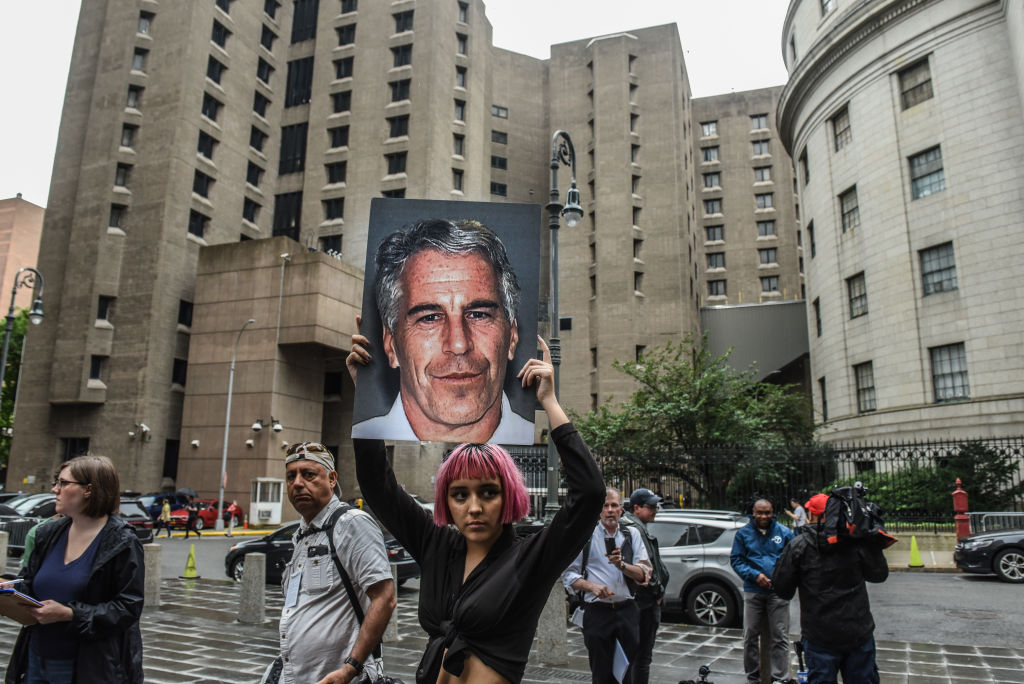Here are a few fascinating facts about the death of Jeffrey Epstein, the mysterious financier, friend to the rich and powerful, prolific ephebophile and alleged organizer of a child abuse ring. He was taken off suicide watch despite apparently attempting suicide just weeks before; his guards were asleep while he was reportedly hanging himself despite his being perhaps the most high-profile convict in the United States; two cameras outside his cell allegedly malfunctioned, and his friend and alleged accomplice Ghislaine Maxwell has somehow disappeared. Perhaps there are innocent explanations for all of these curious facts, but can you sincerely blame anyone who asks the question of whether there has been a conspiracy?
The Epstein case really has something for everyone. American liberals can point to Epstein’s association with President Trump. American conservatives can point to Epstein’s far deeper connections to Bill Clinton. More old school conspiracy theorists can point to Epstein’s friendship with Prince Andrew of the British royalty, or his membership of the Trilateral Commission and the Council on Foreign Relations. Really, speculating about the Epstein case has been a wonderful way to bring Americans together.
Still, some skeptical voices have resisted the temptation to indulge ‘conspiracy theories’. EJ Dickson of Rolling Stone, for example, has chided the Washington Post‘s Carol Leonnig for her ‘apparent willingness to explore if Epstein [was] murdered — or, at least, her refusal to refrain from directly engaging with that theory.’
Dickson has some fair points, noting that Leonnig leapt on the idea that Epstein’s corpse revealing a broken hyoid bone pointed away from suicide with excessive haste (broken hyoid bones can be a consequence of hanging as well as strangulation.) Still, why is it so ‘dangerous’ to explore questions of conspiracies?
I do not oppose ‘conspiracy theories’ for the simple reason that conspiracies exist. MK-ULTRA and COINTELPRO were real. Iran-Contra happened. Enron was no figment of the imagination. I will go further and suggest that strange, conspiratorial events have yet to be exposed. I doubt that Libyans perpetrated the Lockerbie bombings. It would not surprise me if the Kremlin was involved in the bombings of the Moscow apartment blocks. I would not blame anyone for wondering if JFK’s assassination was not quite what history informs us. In its essential form, a conspiracy is a pair or a group of people engaged in covert behavior – which, as we generally understand the term, is malicious and illegal. On the level of the street this called organized crime. Anyone who doubts that this can transcend social classes has not been paying attention to history.
Smug liberal rationalists might listen to one of their heroes, Christopher Hitchens, on this point. Writing in the London Review of Books, the Hitch said of ‘conspiracy theory’:
‘One has become used to this stolid, complacent return serve: so apparently grounded in reason and skepticism but so often naive and one-dimensional.’
Well, fine. Most people would accept that some conspiracies exist. But there is Iran-Contra and then there is David Icke. There is Enron and there is Alex Jones. The problem is that there is no clear line between plausible and absurd theories of conspiracy. Brian L. Keeley, a philosopher at Pitzer College, judged in his essay ‘Of Conspiracy Theories’ that there is ‘no criterion or set of criteria that provide a priori grounds for distinguishing between Warranted Conspiracy Theories and Unwarranted Conspiracy Theories.’ You cannot separate the possible and the preposterous with any rigor, then, without considering their empirical claims.
But here lie two problems. The first is the sheer scale of the evidence presented in conspiracy theories. If you piled up all of the books about JFK’s assassination in Dealey Plaza, for example, you could walk down from the sixth floor of the Texas School Book Depository to the street on a staircase made of paper. Enough data surrounds significant world events that the potential to accumulate argumentation over each detail is vast. Second, the slipperiness of conspiracy theories, by which I mean their reliance on innuendo and tendency to mutate as fact claims are falsified, makes them difficult to pin down. Human beings are pattern-seeking creatures in thrall to personal and tribal biases, which means our willingness to accept ornate ideas which explain our failings, demonize our enemies or are just novel, interesting and sensational is keen. This is why ‘conspiracy theory’ serves as entertainment and information, as Robert Anton Wilson and Robert Shea explored in The Illuminatus! Trilogy, but that does not preclude them from being toxic and destructive in their most hateful and paranoid forms, such as with The Protocols of the Elders of Zion.
Still, I would like to return to Hitchens’s essay. ‘Conspiracy theories’, he wrote, are:
‘…the white noise which moves in to fill the vacuity of the official version. To blame the theorists is therefore to look at only half the story, and sometimes even less.’
Even the most innocent – the most innocent – interpretation of the Epstein case is that a boorish windbag was allowed to penetrate grand halls of intellectual, cultural and political influence solely on the basis of his mysterious wealth, and then died because of a failure to establish even the kind oversight one might expect from a convenience store owner. In such a dysfunctional society people cannot be blamed for overworking their imaginations. The kindest non-conspiratorial explanation is that American elites roll out the red carpet for any fool or scoundrel who has something to offer them and drops them down the memory hole once they are inconvenient.
Not that I am ruling out conspiracy! Epstein’s whole life appears to have been conspiratorial. Even his alleged associates appear to be devising conspiracy theories to defend themselves, such as the suggestion from Prince Andrew’s lawyers that a photo showing their client with his accuser is a fake – so it would have been a fitting death. It is important to insist on a thorough, transparent investigation of the case, though, to move the evidence beyond the shadows of dark speculation and into the light.



















